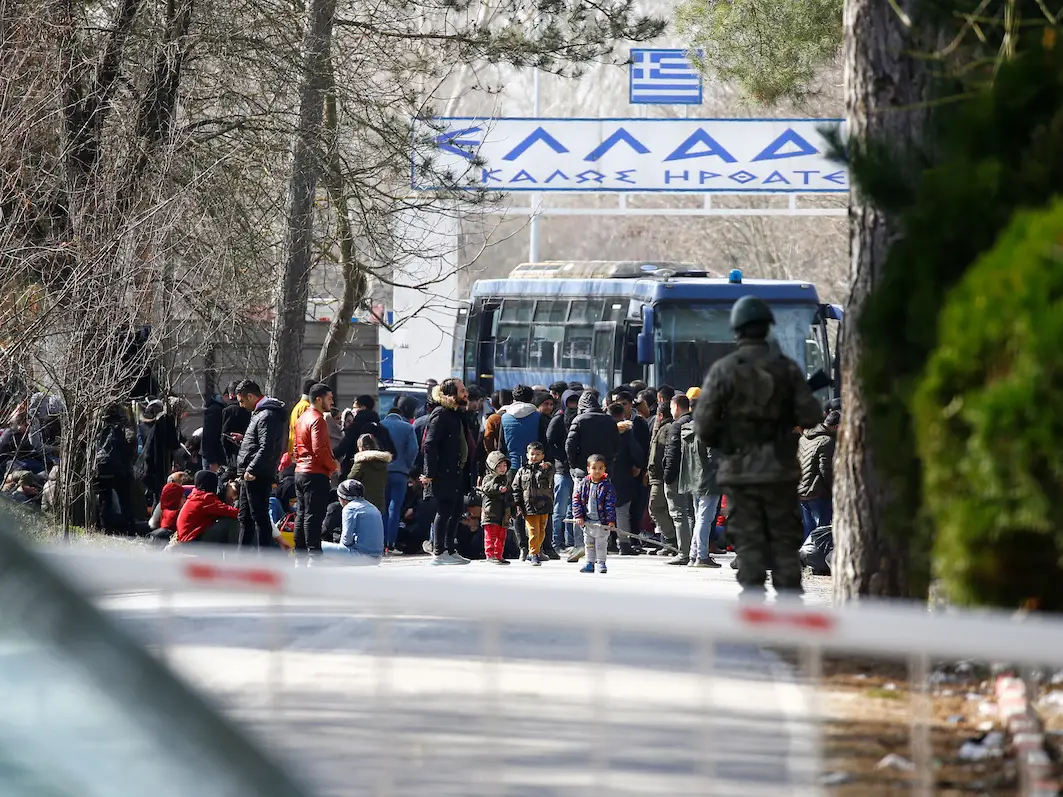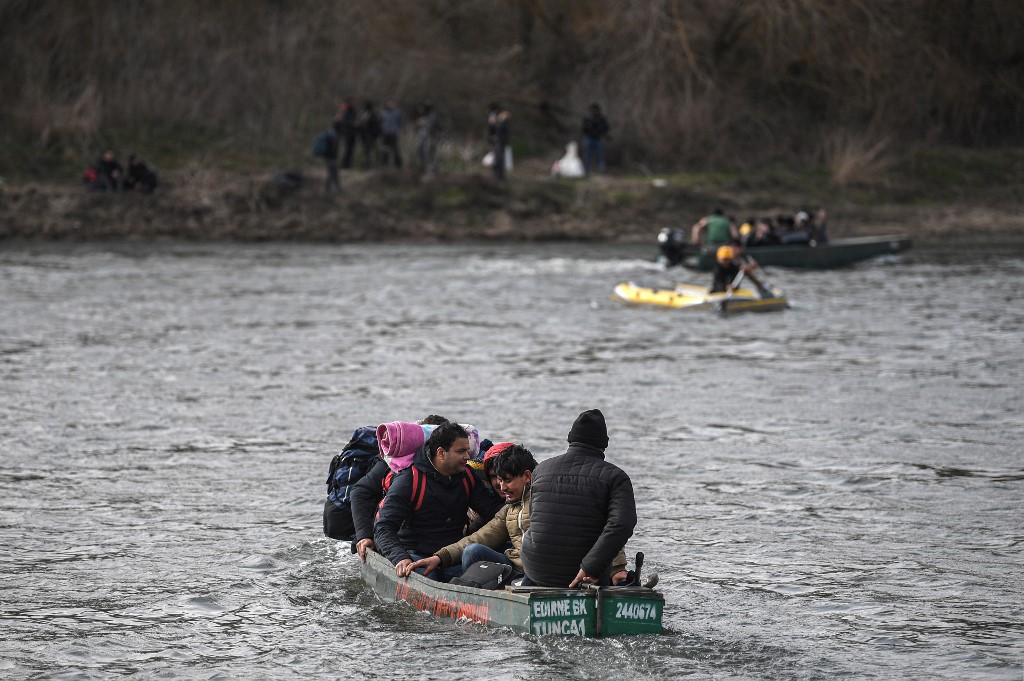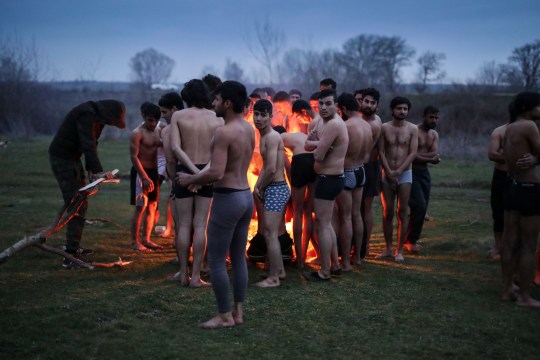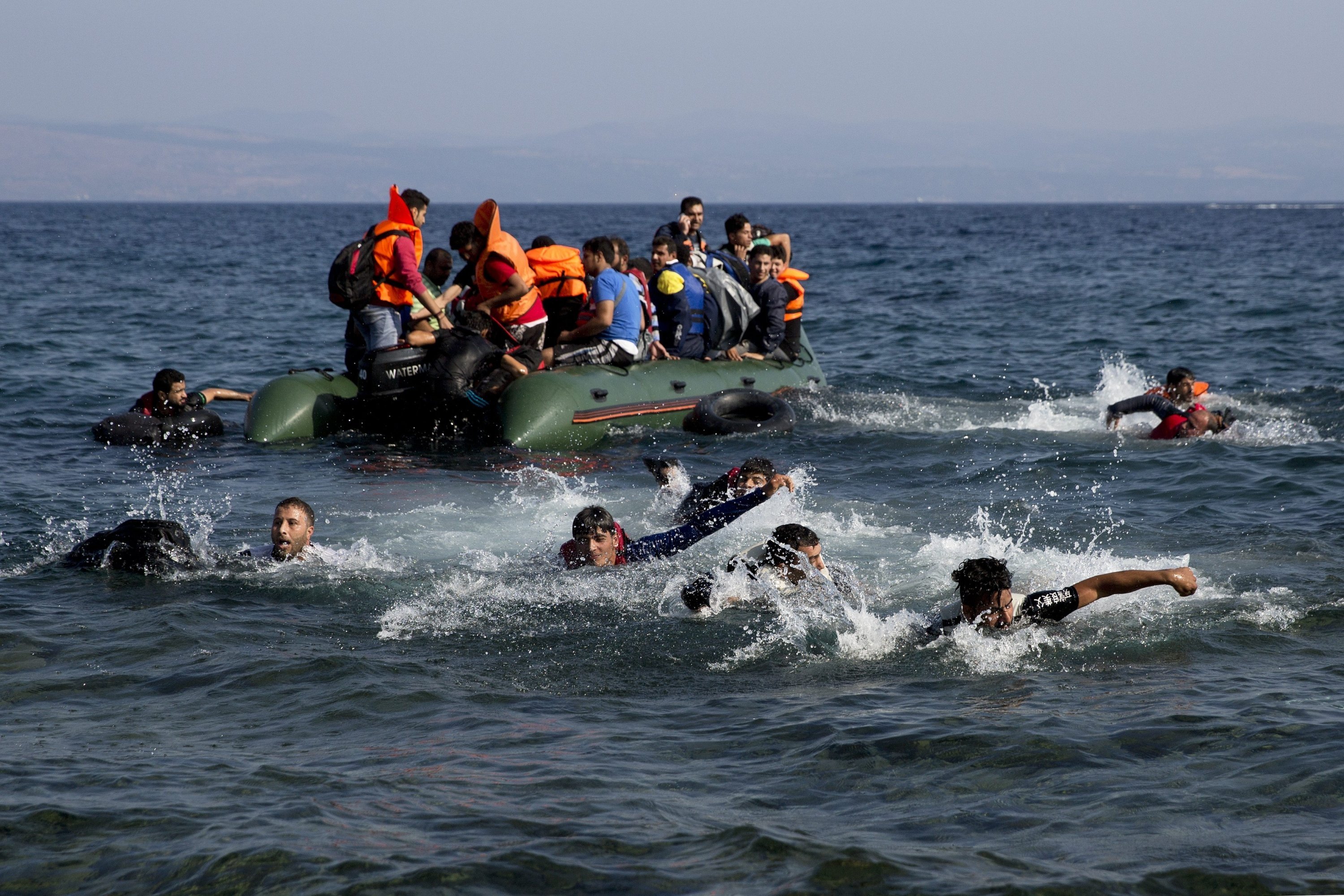How Greece Implemented a Malicious Plan to Confront Migrants From Turkiye

A recent investigation revealed that Greece recruited a network of mercenaries to prevent migrants from crossing the border with Turkiye.
The investigation presented horrific testimonies for the first time, given by people who worked in the ranks of mercenaries, as they were deceived after they were recruited by the Greek government, and they were the cause of injuries and permanent physical disabilities to many migrants who tried to cross the border towards Europe.
It is noteworthy that many asylum seekers lose their lives while trying to cross from Turkiye to Europe, as a result of being severely beaten and inhumane treatment by border guards, especially in Greece and Bulgaria, amid an international silence that resulted in many victims, including children, as a result of unjustified bullets, or a reckless act that resulted in death or injury.
Deportation of Migrants
The Guardian newspaper revealed that the Greek authorities are forcibly recruiting or luring asylum seekers through agents, and then using them to push back migrants coming towards Greece in order to return them to Turkiye.
Six migrants, from Syria and Morocco, told the British newspaper how they participated in pushbacks on the Evros River under duress, in exchange for a warrant from the Neo Cheimonio and Tychero police allowing them to stay for a month in Greece.
An investigation by the Guardian, LightHouse Reports, Le Monde, Der Spiegel, and ARD Report Munich obtained visual evidence and documents confirming the men's testimony and their detention by border guards in Evros.
Mike's operation runs in plain sight, from a container next to Neo Cheimonio station. We obtained pics showing him on site. He's known to locals who confirmed where Mike lives & works to reporters. pic.twitter.com/2A4bMKYrtK
— Lighthouse Reports (@LHreports) June 28, 2022
One of the testimonies documented by the investigation is of a Syrian migrant called Seif (a pseudonym), who is in his twenties, and he is one of the victims of Greece who were recruited in exchange for paying $5,000 in order to obtain papers allowing him to stay in Greece.
Seif says: “There is a network in Istanbul that specializes in recruiting people to work for the Greek border guards. The network takes about $5,000 from the migrant and then transfers him to the border and across the river to Greece, but if the refugee refuses to work, the money is not returned to him, and it is returned with the arrivals to the Turkish side.”
Seif pointed out that “material and family conditions forced him to emigrate, but Greece took advantage of this need and recruited him into the ranks of mercenaries; his job was to drive the boat up the Evros River to take migrants caught inside Greece to the Turkish bank.”
Seif recounted how he fell victim to insurance fraud, who threatened to lose his money if he refused to work as a mercenary in Greece, adding that “on one occasion, while they were trying to push migrants to Turkiye, the boat capsized twice and two migrants fell on the Greek side, but the Greek police and the network that recruited him, led by a person called Mike (a pseudonym), refused to rescue them.”
Seif added: “I also saw the bodies of two people on the island between Turkiye and Greece, who often died because of the cold. We could not approach them because of the strong smell.”
The investigation pointed out that “the Greek guards not only beat the migrants, but also stripped them of money, valuables, and even their clothes, through Mike, who many witnesses said was harassing women, as he once, according to Seif, stripped a woman of her clothes in front of her husband.”
Greek police are using refugees as ‘slaves’ to force 1000s of desperate asylum seekers back to Turkey. For the first time you can hear one of them talk on camera about being forcibly recruited into violent operations that Greece still denies pic.twitter.com/jCqDxUWZsw
— Lighthouse Reports (@LHreports) June 28, 2022
The investigation also transmitted the testimony of Abu Mazen (pseudonym), a Syrian migrant who worked in the ranks of mercenaries and the Greek border guards, and how he was recruited by the Greek government and transported to the border in cars up to the Evros River.
Abu Mazen stated that he was also threatened if he tried to take any step that could be harmful to mercenaries or border guards, pointing out that Mike was stripping the migrants of their clothes and throwing them into the river.
Basil, a Syrian refugee, said he crossed the Evros River to Greece, hoping to seek asylum, but the Greek police assaulted him with batons and took him to Tychero police station, where they ordered him to take off his clothes and put him in a cell for 3 months.
He added that after the police discovered that he spoke English, they offered him a deal according to which he would work with the police in exchange for a permit to stay in Greece for one month, and he will be held during the day and released at night to fend off other asylum seekers, or he will be charged with human smuggling and go to prison.
“I was told you will not be paid for this work, but you can choose whatever property you want from the migrants,” Basil said.
Local residents of the Greek border villages confirmed to the authors of the investigation that there are several migrants, usually masked, who work for the Greek police.
Two senior Greek officers also confirmed that the Greek authorities' use of third-country nationals as proxies in operations to confront migrants and force them to return to Turkiye represents a new dimension of the brutality.
Malicious Plan
According to Human Rights Watch, this technique, which is based on the use of migrants to return new arrivals to Turkiye, has been repeated in the testimonies of many victims since 2020, especially in the wake of tensions at that border in March 2020, when Ankara threatened to allow thousands of migrants to cross into Europe.
Therefore, the Greek authorities intensified the use of this immoral practice to prevent its forces from approaching Turkish territory too dangerously to Turkish territory, as confirmed by three police officers stationed at the border.
In March 2020, tens of thousands of migrants tried to head toward Europe across the Greek-Turkish border, but the Greek authorities confronted them and prevented them from crossing with the help of the European Border and Coast Guard Agency, Frontex.
Since then, reports of forcible returns by the Greek authorities of migrants and asylum seekers from Turkiye have multiplied.
From the beginning of this year until last April, the Greek authorities prevented about 40,000 migrants from entering the country via the Evros River, according to the Greek Minister of Civil Protection, Takis Theodorikakos.
On May 23, the Greek Coast Guard prevented the entry of 600 migrants coming from Turkiye towards Greece via the Aegean Sea, the highest number of migrants recorded this year.
On February 02, the Turkish forces found the bodies of 12 Syrian asylum seekers while trying to cross to the gates of the European Union, where they were frozen from the cold after they were stripped of their clothes and belongings in Greek territory and returned to Turkish territory.
On his part, lawyer Abdel Nasser Hoshan explained to Al-Estiklal that “it is no longer a secret to anyone about the Greek government's policy regarding the refugee file. It refuses and prevents the transit or acceptance of refugee applications coming through Turkiye, on the grounds that Turkiye is a safe country for these refugees.”
“Deliberate killings, torture, arbitrary arrests, and enforced disappearances have been monitored on the Greek borders, in addition to the dumping of seagoing boats on its shores with migrants, as well as the use of electro-acoustic devices on the border strip, which causes permanent hearing impairment,” he added.
Lawyer Hoshan also emphasized that “recruiting former refugees to torture and dispose of new asylum seekers is a flagrant violation of international law, especially the 1951 International Convention for the Protection of Refugees.”
“Because of the historical political differences between Turkiye and Greece, Athens is exploiting the refugee file to put pressure on the Ankara government, prevent migrants from crossing, and forcibly return them to Turkish territory, without the slightest level of humanity,” he noted.
Lawyer Hoshan stressed that the main party that is “responsible for the violations against asylum seekers and migrants is the Greek government through its brutal practices and arbitrary decisions taken several years ago, and this gave a green light to the border guards to commit grave violations without making them liable to any accountability.”
Violations against Refugees
The United Nations Special Rapporteur on the rights of migrants, Felipe Gonzalez Morales, revealed on June 21, 2022, that at least 17,000 migrants trying to reach Greece by sea were forcibly returned to Turkiye during the past two years.
Morales explained that returning refugees and migrants has become a state policy in European countries and that this practice continues despite warnings from international organizations, warning the international community of the consequences of attempts to cover up these measures, especially in Greece.
This is not the only Greek border guards responsible for these violations, although most of them are taking place with its intervention, as numerous reports provide evidence of the involvement of the elements of the Frontex in these sea pursuits, which in most cases end with the sinking and death of refugee boats.
On April 27, 2022, European media published a report on Frontex's involvement in humanitarian violations against refugees in the Aegean Sea.
The report revealed that “the European Agency participated in 222 forced deportations of refugee boats near the Greek islands, between March 2020 and September 2021, as part of Operation Poseidon, which it was leading with the Greek border guards.”
Twenty-two of these operations, carried out by Frontex elements, involved a total of 957 asylum seekers.
Le Monde newspaper monitored, by analyzing the agency's data, that the boats the refugees were traveling in were identical to the rubber boats purchased by the Greek border guards, which proves that they reached Greek territory and were sent back to the sea instead of rescuing them.
Turkiye accuses Greece of violating human rights by adopting a policy of return and attacking migrants, threatening their lives, and stealing their property, which is rejected by Athens and says that it applies the policies of the European Union regarding the influx of refugees, which it supports with hundreds of millions of euros annually for this purpose.
The European Union, in turn, says that it seeks common ground on migration issues and expresses its grave concern about what is happening at the border between Greece and Turkiye, and along with the United Nations has called for repeated statements to open investigations into the violations committed.
However, according to European law, Greece is obliged to consider asylum applications for people who arrive on Greek territory and seek protection, but the Greek authorities have systematically violated this law for years, as in other countries in the European Union.
Sources
- Revealed: Greek police coerce asylum seekers into pushing fellow migrants back to Turkey
- Greek Police Coerce Refugees to Commit Illegal Pushbacks
- The Greek police are using foreigners as “slaves” to forcibly return asylum seekers to Turkey
- Frontex at Fault: European Border Force Complicit in ‘Illegal’ Pushbacks
- Frontex, the European border guard agency, has covered up illegal returns of migrants in the Aegean Sea [French]














